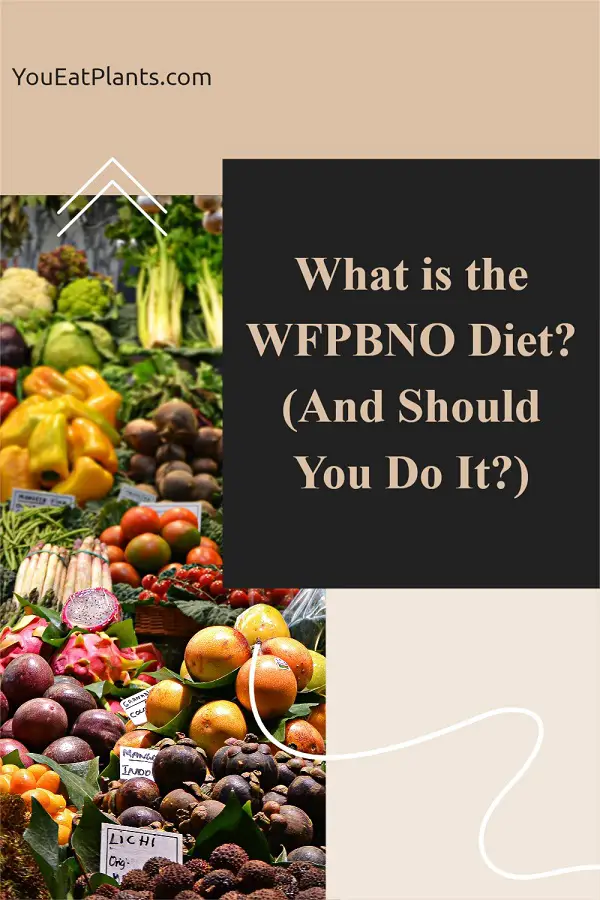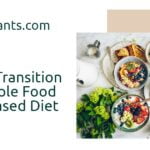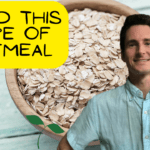
Although not as common of a term to hear as the Plant-Based Diet, you may have heard the phrase the WFPBNO and didn’t know what it was referring to.
In this post, I will briefly explain the WFPBNO diet and its meaning. After that, we will look at if the WFPBNO is a good option for you!
Contents
What is WFPBNO?
WFPBNO stands for Whole Food Plant-Based No Oil.
This is basically a more narrowed-down version of the Whole Food Plant-Based Diet (abbreviated WFPB or WFPBD) You can learn more about the WFPB Diet and what it is at What is the Whole Food Plant-Based Diet? And for a complete guide to it, check out The Whole Food Plant-Based Diet (WFPB) Beginners Guide.
Essentially the Plant-Based Diet is a diet that seeks to minimize or eliminate animal-based foods such as meat and dairy. The Whole Food Plant-Based Diet takes this one step further by trying to eliminate processed foods, and only eat plant-based foods in their whole, natural, and healthiest forms.
The WFPBNO takes this even one step further by eliminating oil from the diet as well. So you will be eating plant-based foods in their whole forms (so minimally processed foods) as well as eliminating oils from the diet.
Is the WFPBNO Diet Better?
This is a tricky subject because it can really depend on the person and the goals as to whether the WFPBNO would be a better choice for them compared to just the WFPB diet.
I think that everyone should incorporate a plant-based diet of some kind, and there are many benefits to eating a plant-based diet found here. This could even be a Vegan, a Vegetarian, or a Mediterranean Diet.
A Whole Food Plant-Based Diet is even better, especially for your own health, since you will focus on eating healthier foods. But is a WFPBNO diet even better than this?
Well, first it should be noted that oils can be a little bit controversial. Some might argue that they are processed foods, and shouldn’t be in a Whole Food diet. However, at the same time, a lot of oils have been found to have positive health benefits.
Also, many of these oils have been around for thousands of years, and are not quite so processed as we tend to think when we think about processed foods. For example, many of these oils are made by just squeezing the food in order to get the oil out.
But, at the same time, there are newer oils such as vegetable oils which ARE heavily processed foods. But despite that, even some of these have been found to have some health benefits, especially when used in place of animal-based foods such as butter or lard.
Should You Do a WFPBNO Diet?
I think the answer to the question of whether to do a WFPBNO Diet is dependent on the person!
While I think that everyone would benefit from doing a Whole Food Plant-Based Diet, if you are wondering if you should do WFPBNO as well and eliminate oil, here are my thoughts on that.
The good thing about WFPBNO is that it will naturally remove many processed foods and fast foods. (This is because most processed foods and fast foods have an oil of some type, especially vegetable oils) However, if you are eating Whole Food Plant-Based, you will probably eliminate a lot of these foods anyway.
So when might it be better for someone to do WFPBNO? I think if you are someone who is trying to lose weight, then WFPBNO might be better for you.
This is because oils actually have the most calories in them out of any of the foods you eat. Basically, oils are composed of fats, and calories from fats are more than 2 times that of carbs or proteins.
Technically, calories from fat give you 9 calories for the same amount of food, compared to 4 calories each for protein or carbs.
And since calories that you consume, versus calories that you burn off, is the number one factor in weight loss or weight gain, then getting a higher amount of calories from oils or fats, will likely make it harder for you to lose weight. However, by cutting these oils and consequently their calories from fat out of the diet, you can lose more weight. (This is why participants who ate a low-fat Vegan diet lost much more weight than the control group in the study at Vegan Diet for Weight Loss Shown to be Very Effective)
However, if you are someone who is comfortable with your weight, then you can eat some of these oils and you should not have a problem. This can help you to still get the health benefits from these oils, and also not have to be too restrictive in your diet, which can easily lead to quitting a diet altogether.
And if you are someone who is trying to GAIN weight, then I think you definitely need oils in your diet. And you should absolutely not cut oils out, because this will make it tremendously harder for you to actually gain weight, especially when you are eating plant-based since you will already be getting fewer calories.
Lance has been passionate about the plant-based diet and we have been following a whole food plant-based diet for over 5 years. We focus on health, natural healing, weight management, animal rights, and the health of the planet and environment by focusing on whole plant-based foods and sustainable practices.
Learn more at the About Me page and follow on social media at the links below.



